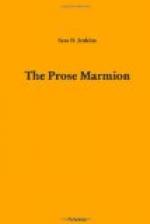“And thus, for both,
he madly planned
The ruin of himself
and land.”
For these two artful women he sacrificed the true happiness of his home.
“Nor England’s
fair, nor France’s Queen,
Were worth one pearl-drop
bright and sheen,
From Margaret’s
eyes that fell,—
His own Queen Margaret,
who, in Lithgow’s bower
All lonely sat, and
wept the weary hour.”
In gay Holy-Rood, Dame Heron, Lady of Norham, smiled at the King, glanced archly at the courtiers, and ably played the coquette. When asked to draw from the harp music to charm the ring of admirers, she laughed, blushed, and with pretty oaths, by yea and nay, declared she could not, would not, dare not! At length, however, she seated herself at Scotland’s loved instrument, touched and tuned the strings, laid aside hood and wimple, the better to display her charms, and with a borrowed simplicity well assumed, sang a lively air, Lochinvar.
“Oh, young Lochinvar
is come out of the west,
Through all the wild
border his steed was the best;
And, save his good broadsword,
he weapon had none,
He rode all unarm’d,
and he rode all alone;
So faithful in love,
and so dauntless in war,
There never was knight
like the young Lochinvar.
“He stayed not for brake,
and he stopped not for stone;
He swam the Esk river,
where ford there was none;
But ere he alighted
at Netherby gate,
The bride had consented,
the gallant came late;
For a laggard in love,
and a dastard in war,
Was to wed the fair
Ellen of brave Lochinvar.
“So boldly he entered
the Netherby Hall,
Among bride’s-men,
and kinsmen, and brothers, and all:
Then spoke the bride’s
father, his hand on his sword,
For the poor craven
bridegroom said never a word,
’O come ye in
peace here, or come ye in war,
Or to dance at our bridal,
young Lord Lochinvar?’
“’I long woo’d
your daughter, my suit you denied;
Love swells like the
Solway, but ebbs like its tide—
And now am I come, with
this lost love of mine,
To lead but one measure,
drink one cup of wine.
There are maidens in
Scotland more lovely by far,
That would gladly be
bride to the young Lochinvar.’
“The bride kiss’d
the goblet: the knight took it up,
He quaff’d off
the wine, and threw down the cup,
She look’d down
to blush, and she look’d up to sigh,
With a smile on her
lip, and a tear in her eye,
He took her soft hand,
ere her mother could bar,—
‘Now tread we
a measure!’ said young Lochinvar.
“So stately his form,
and so lovely her face,
That never a hall such
a galliard did grace;
While her mother did
fret, and her father did fume,
And the bridegroom stood
dangling his bonnet and plume;
And the bride’s-maidens
whisper’d, ’’Twere better by far
To have match’d
our fair cousin with young Lochinvar.’




